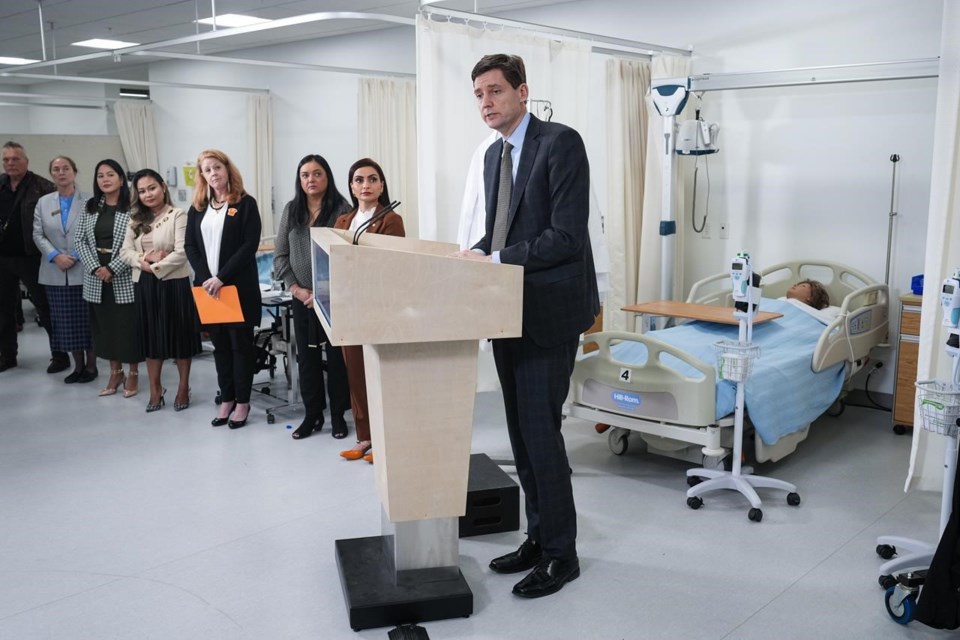VANCOUVER — The British Columbia government will pay fees for international nurses and help finance former nurses who want to return to health care in a push to get more workers into the system.
Premier David Eby told a news conference Monday that the province will also spend $1.3 million to set up a new pathway for internationally trained nurses and assess applications faster.
Candidates are waiting up to three years now, but he said the government's goal is to cut that wait down to between four and nine months.
The changes mean internationally educated nurses will no longer be required to pay application and assessment fees upfront, which can be over $3,700.
Jennie Arceno, an internationally trained nurse from the Philippines, said it took her three years to obtain her B.C. registered nursing licence, a process that cost about $40,000 in assessment, registration and tuition fees.
She said she hopes the new process means the pathway will be easier and faster for others.
"Having the registration and (Nursing Community Assessment Service) fees waived will also be a big help, as it's already very expensive to move to B.C. from another country," Arceno said. "I know these changes will inspire more IENs (internationally trained nurses) to come to B.C. and start a fulfilling new chapter in their lives."
The government said it will offer financial support of up to $4,000 to cover applications, assessments and eligible travel costs for current nurses to re-enter the system, along with up to $10,000 in bursaries for any additional education they might need to get back to work.
B.C. Nurses Union president Aman Grewal said the changes offer hope for a strained and understaffed health-care system.
"At the moment there are, as of this past spring, 5,200 vacancies here in B.C. and by 2031, we need 26,000 new nurses," she told the news conference.
"Not only will the addition of these nurses alleviate some of the pressure on the current state of our staffing crisis, the diversity (and) the experiences that they bring will help to serve the cultural needs of our patient populations throughout the health-care system."
The announcement came as 20 emergency operation centres reopened on Monday in hospitals around the province to cope with an expected spike in flu, COVID-19 and other respiratory illnesses.
More than 10,000 patients are in B.C.’s hospitals, pushing some over their capacity.
Eby said he expects to see results from the new funding soon.
"There are 2,000 nurses right now that are in this approval pipeline that could be on the floor, in hospitals, within 90 days," Eby said. "It is a remarkable shift."
Last April, the province announced it would be simplifying the application and assessment process for eligible international nurses, and that B.C. would provide a maximum of $16,000 each to about 1,500 nurses in 2022 to pay for everything from application fees to English-language testing and educational upgrades.
Eby noted that since then, 5,500 nurses have said they want to work in B.C.
"More than 90 per cent of applications were received after our government's initial actions to welcome internationally educated nurses into our health-care system," he said, referring to the April announcement. "There is still much work ahead of us, but I'm optimistic about the impact that these changes will have in a very real way for British Columbians."
Health Minister Adrian Dix said the move marks "another significant day" in B.C.'s Health Human Resources Strategy. When it was released in September, Dix said the five-year plan would redesign how health staff work, as well as retain, recruit and train workers through 70 action items.
Monday's announcement follows the expansion of a program through which internationally educated family doctors can become licensed to work in B.C., which was unveiled in November.
Dix said the nursing announcements represent another step toward ensuring people throughout the province have greater access to the health services they need.
"Nurses are in significant demand and to put impediments in the system, both in time, which costs money, and costs for people simply to apply and go through our process, is not the best approach."
This report by The Canadian Press was first published Jan. 9, 2023.
Brieanna Charlebois, The Canadian Press



